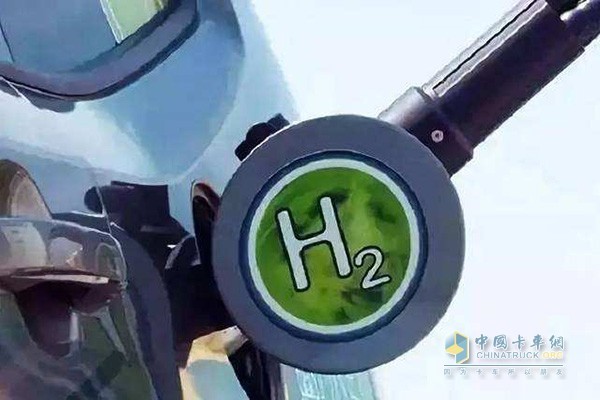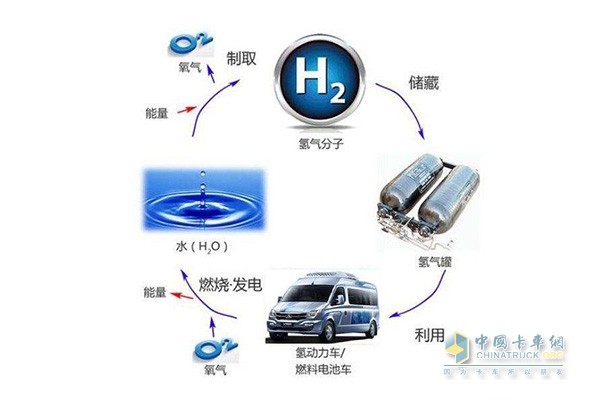Formulate a hydrogen energy development plan, Zhuzhou wants to take the lead in the hydrogen fuel cell vehicle industry
release time:
2019-03-21
As hydrogen energy is officially written into the government work report, the development of the domestic hydrogen energy industry will be given new vitality. On March 21, 2019, it was learned that Zhang Yong, deputy director of Zhuzhou Development and Reform Commission, said that Zhuzhou has completed the layout of the entire industrial chain such as hydrogen production, hydrogen supply, hydrogen fuel cells, complete vehicles, and hydrogen refueling stations. Industrial Development Plan (2019-2025). After the hydrogen energy was confirmed to be included in the government work report, the city's hydrogen energy development plan was announced. It is self-evident that Zhuzhou City hopes to take advantage of the development of the domestic hydrogen energy industry and take the lead in the development of the hydrogen energy industry.
As hydrogen energy is officially written into the government work report, the development of the domestic hydrogen energy industry will be given new vitality. On March 21, 2019, it was learned that Zhang Yong, deputy director of Zhuzhou Development and Reform Commission, said that Zhuzhou has completed the layout of the entire industrial chain such as hydrogen production, hydrogen supply, hydrogen fuel cells, complete vehicles, and hydrogen refueling stations. Industrial Development Plan (2019-2025). After the hydrogen energy was confirmed to be included in the government work report, the city's hydrogen energy development plan was announced. It is self-evident that Zhuzhou City hopes to take advantage of the development of the domestic hydrogen energy industry and take the lead in the development of the hydrogen energy industry.

Turning back to the plan, Zhuzhou City plans to form a pillar industry of hydrogen energy and fuel cells by 2025, build 12 hydrogen refueling stations, and form a production capacity of 2,000 fuel cell buses per year and 8,000 fuel cell passenger vehicles and commercial vehicles per year. year.
The Chang-Zhu-Tan urban agglomeration operates 2,000 fuel cell vehicles, commercial and logistics fuel cell vehicles, 1 million square meters of hydrogen fuel cell combined heat and power demonstration buildings, and the industrial output value of the entire industry chain reaches 80 billion yuan.
Zhang Yong introduced that the history of hydrogen energy production and utilization in Zhuzhou City can be traced back to the by-product hydrogen production of chlor-alkali in Zhuzhou Chemical Plant and hydrogen production by electrolysis of water in Plant 601.
Among them, Zhuzhou Chemical Plant has two 20,000-ton/year caustic soda production lines. Calculated based on the by-product hydrogen of 270 cubic meters per ton of caustic soda, the annual by-product hydrogen is 64.8 million cubic meters. After more than 50 years of development, Zhuhua Group has cultivated a professional technical team for hydrogen production, equipment management, system operation and design.
On the basis of inherent hydrogen energy, Zhuzhou City has gradually grown a number of important hydrogen energy industry chain enterprises: Zhenbang Hydrogen Energy, which focuses on the research of hydrogen fuel cell stacks; Hualong Special Gas, which focuses on the production and development of special gases; has delivered hydrogen fuel cell buses and is engaged in the development of a new generation of SiC high-power fuel cell DC/DC converters in the CRRC era; a third party with a designed capacity of 1700Nm3/h of natural gas hydrogen production equipment Hydrogen supply enterprises are expanding the standard hydrogen; paying attention to the new materials of the era in the research and development of polymer materials and engineering applications...
In addition to introducing the development status and goals of the hydrogen energy industry in Zhuzhou City, Zhang Yong also gave detailed answers to the logic behind the development of hydrogen energy in Zhuzhou and the industrial strategy for the layout of hydrogen energy:
Why develop the hydrogen fuel cell vehicle industry?
In the field of new energy, relying on the extension of the rail transit equipment industry chain and the competitiveness of the aviation power industry chain and the automobile industry chain, Zhuzhou has developed and expanded two industrial clusters, the new energy wind power equipment industry and the new energy electric vehicle industry. Power Valley, realize the upgrading of Zhuzhou's industrial chain and value chain.
In December 2018, the "Zhuzhou Hydrogen Energy Industry Development Plan (2019-2025)" jointly formulated by the Municipal Development and Reform Commission and the School of Urban and Environment of Hunan University of Technology gave the reasons for the layout of hydrogen energy: seize hydrogen energy and fuel cells Technology is a major strategic direction of the world's energy transformation and power transformation, and cultivating and expanding the hydrogen energy industry to become a pillar industry is a realistic decision to build a major strategy in Zhuzhou • China's Power Valley.
The plan points out that hydrogen energy and fuel cells are the key areas of my country's energy technology revolution and innovation. Fuel cells are widely used in new energy vehicles, rail transit, aviation, drones, ships, submarines and other transportation fields. Compared with the pure electric vehicle route, hydrogen fuel cell vehicles with higher efficiency, more energy saving and environmental protection are widely regarded as the ultimate goal of the development of new energy vehicles. The development of hydrogen energy and fuel cells is a realistic decision to promote the upgrading of Zhuzhou's power industry.

What are the advantages of Zhuzhou to take the lead in the hydrogen fuel cell vehicle industry?
Zhang Yong believes that, first of all, Zhuzhou has a complete industrial chain. Among them, Zhuzhou has advantages in the most critical "three electric" equipment (ie motor, electronic control, battery) in the hydrogen fuel cell vehicle industry. Especially with the advantages of rail transit industry, Zhuzhou has high-speed rail technology and equipment in motor and electronic control, which is a world-class level. The previous largest short-board battery is currently being supplemented with the enhancement of Zhenbang's hydrogen energy research and development capabilities and the recently introduced Dewei Mingxing hydrogen fuel cell technology project.
At the same time, there is a huge back-end market for Zhuzhou. Within a 40-kilometer radius of Zhuzhou, there are 14 OEMs with a scale of 3 million vehicles. Many companies come to invest in Zhuzhou, all of which have taken a fancy to the advantages of Zhuzhou, hoping to be close to the huge market.
What is Zhuzhou going to do to take the lead in the hydrogen fuel cell vehicle industry?
According to the "Zhuzhou City Hydrogen Energy Industry Development Plan (2019-2025)", Zhuzhou will give full play to the advantages of the three major power industry chains and establish a domestic leading and world-class hydrogen energy application and fuel cell technology chain and industrial chain and industrial cluster area , create a high-end ecosystem, cultivate a group of leading enterprises and leading talents with core competitiveness, build a hydrogen energy and fuel cell technology and industrial innovation system, strive to create a "hydrogen economy demonstration city" of the United Nations Development Program, and create a "Zhuzhou High-tech Zone" "Hydrogen Energy Demonstration Ecological Industrial Park" and "Qingshuitang Eco-Industrial New City Hydrogen Fuel Cell Innovation Demonstration Industrial Park" will build Zhuzhou into a world-class innovation center for the whole industry chain of hydrogen energy and fuel cell technology, an industrial highland and a demonstration benchmark for hydrogen energy applications .
It is expected that by 2025, Zhuzhou will form a pillar industry of hydrogen energy and fuel cells, and build 12 hydrogen refueling stations, including 5 solid-liquid gas three-phase hydrogen refueling stations in Qingshuitang, and the production capacity of fuel cell buses will be 2,000 vehicles per year. The production capacity of battery passenger vehicles and commercial vehicles is 8,000 vehicles per year. The Chang-Zhu-Tan urban agglomeration operates 2,000 fuel cell vehicles, commercial and logistics fuel cell vehicles, and a hydrogen fuel cell combined heat and power demonstration building of 1 million square meters. The entire industry chain The industrial output value reached 80 billion yuan.
What are the specific plans for Zhuzhou to take the lead in the hydrogen fuel cell vehicle industry?
According to the "Zhuzhou City Hydrogen Energy Industry Development Plan (2019~2025)", the city will focus on Hexi High-tech Park and Qingshuitang Eco-Industrial New City to build "Zhuzhou High-tech Zone Hydrogen Energy Demonstration Ecological Industrial Park" and "Qingshuitang" respectively. Eco-Industrial New City Hydrogen Fuel Cell Vehicle Innovation Demonstration Industrial Park”. Among them, Zhenbang Hydrogen Energy, which focuses on hydrogen fuel cell stack research, is in the middle of the hydrogen energy industry chain.
"Qingshuitang Eco-Industrial New Town Hydrogen Fuel Cell Innovation Demonstration Industrial Park" mainly deploys hydrogen energy production, hydrogenation and hydrogen storage equipment manufacturing industries, and establishes a hydrogen energy equipment research institute. Relying on the professional technical strength of the former heavy chemical industry enterprise in Qingshuitang, such as chemical industry, special gas, safety, and special equipment, build a hydrogen energy EPCM operator, carry out the demonstration construction of a hydrogen energy ecological life circle around Qingshuitang, and carry out fuel cell vehicles, solid-liquid gas three Demonstration of applications such as hydrogen refueling stations, fuel cell cogeneration systems, and fuel cell distributed power stations.
Related news

